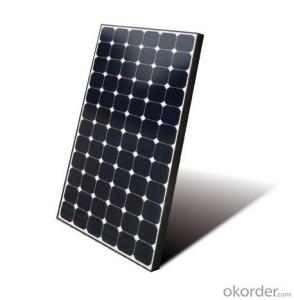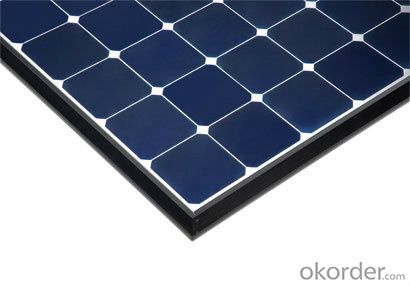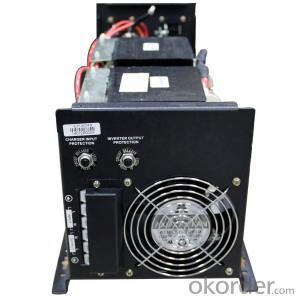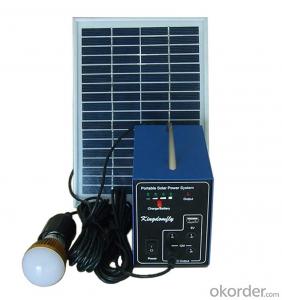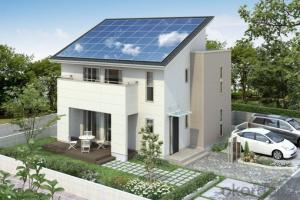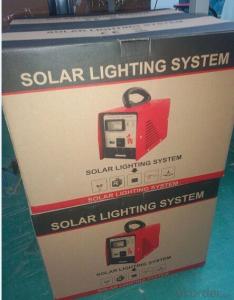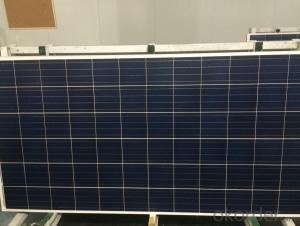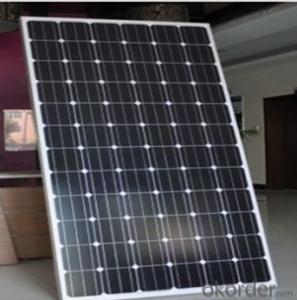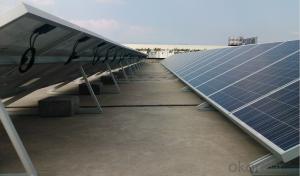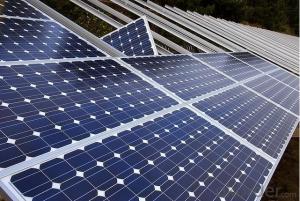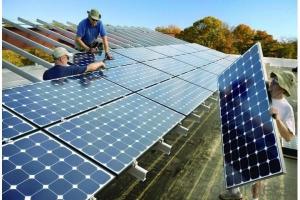Ets Solar Energy Systems 60w Solar Home Solution Approved by TUV UL CE
- Loading Port:
- Shanghai
- Payment Terms:
- TT OR LC
- Min Order Qty:
- 1 pc
- Supply Capability:
- 100 pc/month
OKorder Service Pledge
OKorder Financial Service
You Might Also Like
Specification
60W Solar Home Solution Approved by TUV UL CE
Production description
PV array:
Convert sunlight instantly into DC electric power. Formed by the solar modules (also called photovoltaic
modules) in accordance with the system requirements for series and parallel.
Solar charge controller:
A charge controller may be used to power DC equipment with solar panels. The charge controller
provides a regulated DC output and stores excess energy in a battery as well as monitoring the battery
voltage to prevent over charge or over discharge. An inverter can be connected to the output of a charge
controller to drive AC loads.
Inverter:
Converts DC output power of photovaltaic soalr panels into standard AC power for use in the local off-grid
electrical network. It is a critical component in a photovoltaic system, allowing the use of ordinary
commercial appliances.
Battery banks:
Stores energy when there is an excess coming in and distribute it back out when there is a demand. Solar
PV panels continue to re-charge batteries each day to maintain battery charge.
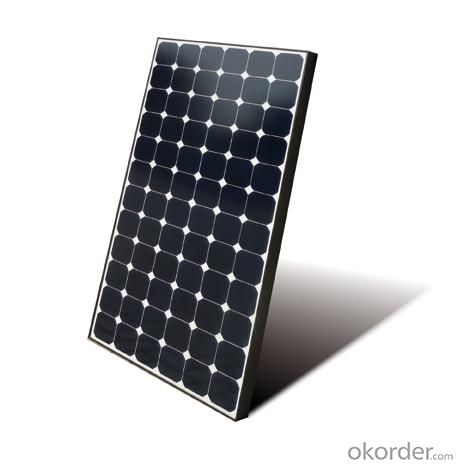
Physical characteristic
1. Rigorous quality control meets the highest international standards.
2. High-transmissivity low-iron tempered glass, strong aluminium frame.
3. Using UV-resistant silicon.
4. IS09001/14001/CE/TUV/UL
- Q: What is the role of inverters in a solar energy system?
- The role of inverters in a solar energy system is to convert the direct current (DC) electricity produced by solar panels into alternating current (AC) electricity that can be used to power common household appliances and be fed into the electrical grid.
- Q: Can solar energy systems be used for heating water?
- Yes, solar energy systems can be used for heating water through the use of solar water heaters or solar thermal systems. These systems capture the sun's energy and convert it into heat, which is then used to warm water for various purposes such as domestic use or swimming pools.
- Q: Can solar energy systems be used in areas with limited access to cultural resources?
- Yes, solar energy systems can be used in areas with limited access to cultural resources. Solar energy systems are a form of renewable energy that can be harnessed in remote areas without relying on traditional infrastructure or cultural resources. This makes solar energy an ideal solution for providing electricity and powering various applications in areas where cultural resources may be limited or inaccessible.
- Q: Can solar energy systems be used in powering shopping malls or retail centers?
- Absolutely, shopping malls or retail centers can definitely utilize solar energy systems to generate power. Solar power has gained immense popularity and cost-effectiveness in recent years, making it a viable choice for commercial establishments. The extensive rooftops and parking lots of shopping malls provide ample space for the installation of solar panels, which can produce a substantial amount of electricity to fulfill the energy requirements of these facilities. By employing solar energy systems, shopping malls and retail centers can diminish their reliance on the grid and eventually lower their energy expenses. By utilizing solar power, these establishments can save on their electricity bills and allocate these savings towards other operational expenses or improvements. Furthermore, the installation of solar panels in shopping malls and retail centers can also enhance their sustainability and environmental credentials. As renewable energy sources, solar systems generate clean electricity without emitting greenhouse gases or pollutants. By transitioning to solar power, these establishments can significantly decrease their carbon footprint and make a positive contribution to the battle against climate change. Moreover, solar panels can serve as a visible demonstration of a mall's commitment to sustainability, attracting environmentally conscious customers who prioritize shopping at eco-friendly establishments. This has the potential to increase foot traffic and revenue for these retail centers. In conclusion, shopping malls and retail centers can undoubtedly make use of solar energy systems to power their operations. By harnessing the sun's power, these establishments can reduce their energy costs, enhance their environmental sustainability, and appeal to customers who value eco-friendly shopping experiences.
- Q: How does the angle of solar panels affect their performance?
- The performance and overall efficiency of solar panels are greatly influenced by their angle. Various factors, including geographical location, time of year, and the specific application, determine the ideal angle at which solar panels should be positioned. When solar panels are correctly angled, they can capture the maximum amount of sunlight throughout the day. The angle directly impacts the amount of direct sunlight that reaches the panels, thus affecting their energy output. If the angle is too steep, the panels may not receive direct sunlight, resulting in reduced energy production. Conversely, if the angle is too shallow, the panels may not capture as much sunlight, leading to lower efficiency. Generally, solar panels are installed at an angle equal to the latitude of the location. However, this may not always be the most optimal angle. For instance, in regions with abundant sunlight year-round, a slight tilt towards the equator could enhance the panels' performance. Seasonal adjustments may also be required to account for the changing position of the sun throughout the year. This can be achieved by manually adjusting the angle or utilizing solar tracking systems that automatically follow the sun's path. It is important to note that the angle is not the only factor affecting the performance of solar panels. Shading, temperature, and the quality of the panels themselves also influence their efficiency. Therefore, it is crucial to conduct a comprehensive analysis and seek professional advice to determine the optimal angle for solar panels. This ensures maximum energy production and a favorable return on investment.
- Q: Can solar energy systems be used in areas with frequent power outages?
- Yes, solar energy systems can be used in areas with frequent power outages. Solar panels generate electricity from sunlight, which means they can provide a reliable source of power even during outages. Additionally, solar energy systems can be combined with battery storage systems, allowing excess energy produced during the day to be stored and used during nighttime or when the sun is not shining. This helps ensure a continuous power supply, making solar energy a viable and sustainable solution for areas with frequent power outages.
- Q: Can a solar energy system be installed in a historic building?
- Installing a solar energy system in a historic building is indeed possible; however, there are certain challenges and considerations that must be addressed. Preservation of the building's architectural and aesthetic integrity is the primary concern when installing solar panels. To minimize any visual impact, the installation should be meticulously planned and executed. This could involve integrating the solar panels into the existing structure or finding discreet locations for their placement. Another aspect to consider is the building's structural integrity. Historic buildings often have distinct construction methods and materials, which must be taken into account during installation. A structural analysis may be required to ensure that the building can support the additional weight of the panels. Furthermore, the electrical infrastructure of the building may need to be upgraded to accommodate the solar energy system. This might involve rewiring or installing additional equipment, all while ensuring that the historic fabric of the building remains uncompromised. Finally, consulting with local authorities and preservation organizations is crucial to ensure compliance with any regulations or guidelines regarding solar panel installation on historic buildings. These entities may have specific requirements or recommendations that must be followed to safeguard the building's historical significance. By carefully planning, consulting, and considering the unique characteristics of the historic building, it is possible to install a solar energy system that provides renewable energy while preserving the structure's historical integrity.
- Q: Do solar energy systems require maintenance?
- Yes, solar energy systems do require maintenance. Regular inspections, cleaning of solar panels, and occasional repairs or replacements of components may be necessary to ensure optimal performance and longevity of the system.
- Q: Can solar energy systems be used in areas with high levels of dust or debris?
- Yes, solar energy systems can be used in areas with high levels of dust or debris. However, regular cleaning and maintenance of the solar panels may be required to ensure optimal performance and efficiency.
- Q: Can solar energy systems be used in areas with limited access to housing?
- Yes, solar energy systems can be used in areas with limited access to housing. Solar panels can be installed on rooftops, open land, or even on portable structures like solar-powered tents or trailers. These systems can provide electricity and power to meet the energy needs of people living in remote or off-grid areas, where traditional power infrastructure may be limited or nonexistent. Additionally, advancements in solar technology, such as compact and lightweight panels, have made it easier to deploy solar systems in areas with limited housing options.
Send your message to us
Ets Solar Energy Systems 60w Solar Home Solution Approved by TUV UL CE
- Loading Port:
- Shanghai
- Payment Terms:
- TT OR LC
- Min Order Qty:
- 1 pc
- Supply Capability:
- 100 pc/month
OKorder Service Pledge
OKorder Financial Service
Similar products
Hot products
Hot Searches
Related keywords
